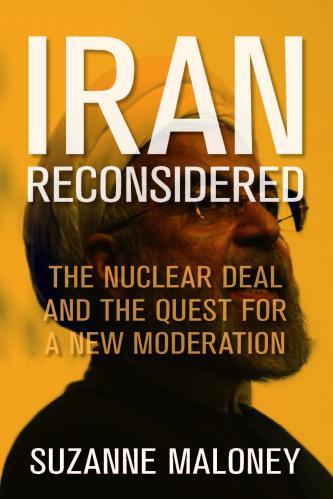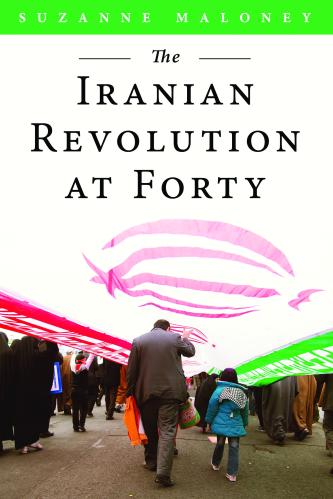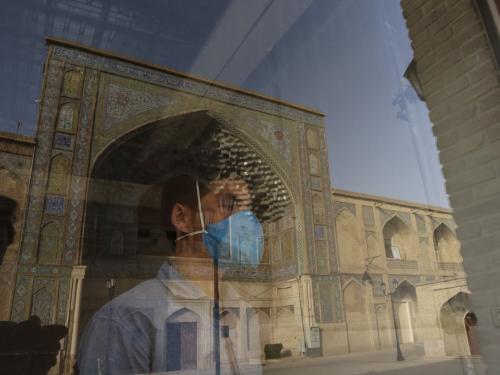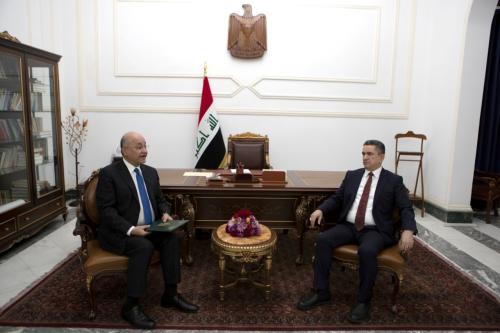Content from the Brookings Doha Center is now archived. In September 2021, after 14 years of impactful partnership, Brookings and the Brookings Doha Center announced that they were ending their affiliation. The Brookings Doha Center is now the Middle East Council on Global Affairs, a separate public policy institution based in Qatar.
While President Trump’s campaign of “maximum pressure” against Iran has been building for three years now, the COVID-19 pandemic is making its impact much more acute. The administration of Iranian President Hassan Rouhani has been pressing the U.S. to ease or lift sanctions in light of the public health and economic crises affecting a huge number of Iranians. Iranian politicians say that they cannot import medical goods under sanctions; the U.S responds that such goods have been excluded from the sanctions list. Both sides owe solid evidence to prove their respective arguments.
Regardless of the exact details, Tehran has tried to use the present coronavirus crisis to improve its international position. Efforts by the Rouhani administration have focused on breaking the “maximum pressure” campaign, while hardliners continue to reject talks with Washington, hoping that the post-coronavirus era will see a new world order to the benefit of those challenging U.S. power.
“Corona-diplomacy” by Rouhani and Zarif
After Trump’s decision to withdraw the U.S. from the nuclear deal (officially the Joint Comprehensive Plan of Action, or JCPOA) in May 2018, Rouhani has come under pressure from his domestic opponents. His approval rating is in decline, according to some of his opponents falling to below 10%. Against this backdrop, he has tried to revive his key campaign promise of ending onerous sanctions.
Toward this end, Rouhani has used a variety of tools to pressure Trump — in many cases via the Europeans — to ease sanctions. More recently, he sent a letter to the leaders of several countries, arguing that lifting sanctions is necessary for the Islamic Republic to effectively fight the coronavirus, while admitting that “sanctions have caused about $200 billion of direct damages to the Iranian economy in less than two years.” In the same vein, Foreign Minister Javad Zarif has stepped up his own efforts, fielding the term “medical terrorism” — instead of merely “economic terrorism” — as a label for U.S. sanctions. He has also made phone calls and sent letters to his counterparts around the world, with his ministry engaged in a Twitter storm to increase pressure on the Trump administration. Zarif called on other countries to outright ignore U.S. sanctions, arguing that sanctions compliance is not moral during a pandemic. Russia and China joined Iran’s demand to lift sanctions.
Alongside efforts to get sanctions eased, speculation abounds that Rouhani and Zarif may be seeking to revive the nuclear deal. Abbas Abdi, a reformist political activist and journalist, says: “Rouhani wants to use the coronavirus for resolving the issue surrounding the JCPOA, lifting sanctions, and ultimately for talks with the United States. And because of this, he does not insist on quarantine.” Unlike other heavily affected countries, the Iranian president has opposed quarantine measures (imposing social distancing rules for only a short period), while Iranian physicians have insisted that such steps are necessary to contain the disease. When in mid-March the virus was rapidly spreading throughout the country, Rouhani said that “there is not any quarantine now and neither during the new year holidays,” which started on March 20 for two weeks. A member of the Chamber of Commerce said that the administration uses sanctions as an excuse to deflect responsibility, pointing out: “While other countries devote 10% of their GDP [to] fighting the coronavirus, Iran does not.”
Reactions in Washington
In spite of high international pressure on Washington to ease sanctions — including from the United Kingdom and human rights organizations — the White House doesn’t seem likely to change course. A State Department spokesperson said the department had “no issues with humanitarian trade so long as it is conducted with strong due diligence measures,” with Secretary Mike Pompeo saying that “the whole world should know that humanitarian assistance into Iran is wide open. It’s not sanctioned.” When asked about Europe’s first-ever use of the INSTEX payment channel — which was designed to sideline U.S. sanctions — to supply Iran with medical goods, Trump shrugged and twice replied: “[It] doesn’t bother me.”
During the Obama administration, Iran resisted sanctions by boosting its nuclear capability (increasing uranium enrichment and the number of centrifuges); ultimately, via the nuclear deal, sanctions were eased. Rouhani has tried to restart this approach vis-à-vis Trump, by reducing Iran’s nuclear commitments, but it has not produced any U.S. concessions so far.
When President Trump decided to withdraw from the nuclear deal in May 2018, Rouhani confidently said that “our people won’t feel problems in their life tomorrow, next week, and over the next years. Now, I am happy that an annoying creature is out of the deal.” But after the U.S. re-imposed sanctions that cut Iran off from the JCPOA’s economic benefits, Rouhani said in September 2019 that he would be open to discussing “small changes, additions, or amendments” to the deal if Washington lifted sanctions. In retrospect, however, these overtures were part of a miscalculation from the Rouhani administration: Renegotiating the deal could have potentially been on the table before May 2018, but not after.
Now, amid the pandemic, the Iranian government’s campaign against Washington’s “maximum pressure” sanctions has yielded important international support, but the Rouhani administration still seems to misread the White House. Instead, Tehran has reverted to stressing its own ability to manage the crisis. On April 13, Zarif tweeted: “Despite US sanctions, Iran has made significant progress in fighting the pandemic,” and Interior Minister Mohammad-Reza Rahmani-Fazli emphasized that “there is no shortage in the country in terms of providing the necessary medical facilities and equipment for coronavirus.”
Dreaming of a post-coronavirus “new world order”
Hardliners in Iran have routinely rejected any renegotiation with Washington. Kayhan, a major ultraconservative daily, has warned that the coronavirus crisis is not a time for talks. It recalled that when the nuclear deal was reached after long negotiations, the U.S. subsequently withdrew from it. Therefore, the paper maintained, negotiating with the U.S. would be the wrong decision. Vatan Emrooz, another hardliner daily, wrote that Rouhani’s policy has been the root cause of Iran’s economic weakness, lamenting: “The only response that has been given to society in this regard was to recommend passive patience in the hope of another president of the United States after the next election.” In the meantime, Baqer Ghalibaf, Rouhani’s two-time presidential rival who is poised to be the next powerful parliament speaker, has criticized the “inefficient management of the administration” during the COVID-19 crisis, accusing it of “concealment of reality, unprofessional optimism, and failure to use public and operational capacities across the country.”
In another key narrative, Tehran presents the coronavirus as an opportunity toward establishing a new world order. According to administration spokesman Ali Rabeie:
Today, the role of the U.S. in the international system is unilateral with economic, political, and military pressure. But in the post-corona era, we may encounter a multilateral world in which the truth is not based on American discourse. We can create a dialogue between Iran and the world for a system of truth production in the new era.
Javan, a daily close to the Islamic Revolutionary Guard Corps, has similarly written that “in the post-corona era, the shape of the international system has created golden opportunities in favor of the Islamic Republic.” It added: “If we make utmost use of the opportunities, Iran will become one of the main actors in the post-corona world. If the West wants to avoid the path of collapse and isolation, they must reform their relations with the East (China, Russia, and Iran).”
While the Rouhani administration’s “corona-diplomacy” has not translated into an easing of the White House’s “maximum pressure” campaign, hardliners in Tehran have reiterated their opposition to talks with Washington, contenting themselves with what they see as a post-coronavirus era on the horizon where their own geopolitical preferences — i.e. a world order with a declining United States — are being fulfilled.







Commentary
Iran’s corona-diplomacy
The Rouhani administration’s miscalculated efforts to get sanctions lifted
April 29, 2020